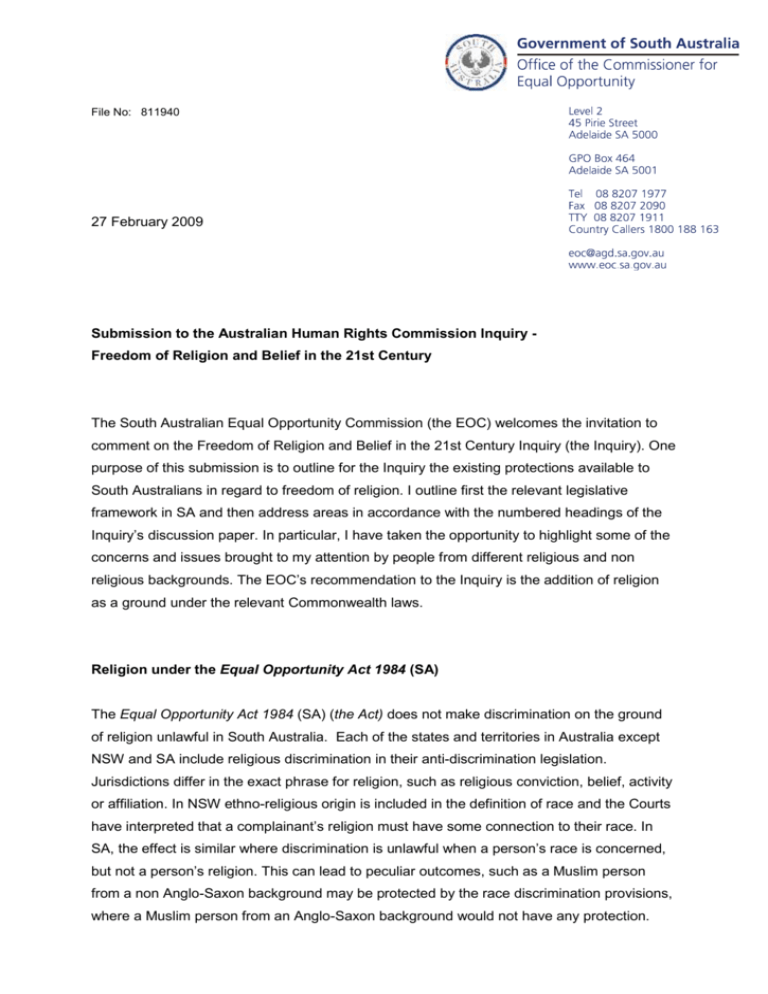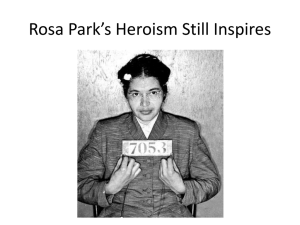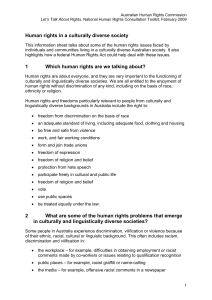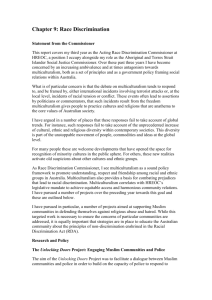V3 Freedom of Religion submission
advertisement

File No: 811940 27 February 2009 Submission to the Australian Human Rights Commission Inquiry Freedom of Religion and Belief in the 21st Century The South Australian Equal Opportunity Commission (the EOC) welcomes the invitation to comment on the Freedom of Religion and Belief in the 21st Century Inquiry (the Inquiry). One purpose of this submission is to outline for the Inquiry the existing protections available to South Australians in regard to freedom of religion. I outline first the relevant legislative framework in SA and then address areas in accordance with the numbered headings of the Inquiry’s discussion paper. In particular, I have taken the opportunity to highlight some of the concerns and issues brought to my attention by people from different religious and non religious backgrounds. The EOC’s recommendation to the Inquiry is the addition of religion as a ground under the relevant Commonwealth laws. Religion under the Equal Opportunity Act 1984 (SA) The Equal Opportunity Act 1984 (SA) (the Act) does not make discrimination on the ground of religion unlawful in South Australia. Each of the states and territories in Australia except NSW and SA include religious discrimination in their anti-discrimination legislation. Jurisdictions differ in the exact phrase for religion, such as religious conviction, belief, activity or affiliation. In NSW ethno-religious origin is included in the definition of race and the Courts have interpreted that a complainant’s religion must have some connection to their race. In SA, the effect is similar where discrimination is unlawful when a person’s race is concerned, but not a person’s religion. This can lead to peculiar outcomes, such as a Muslim person from a non Anglo-Saxon background may be protected by the race discrimination provisions, where a Muslim person from an Anglo-Saxon background would not have any protection. 2 In June 2002, the South Australian Attorney-General released a discussion paper on religious discrimination and vilification. There was great public interest in the paper and over 3,000 submissions were received. The overwhelming response showed a resistance to including religion as a ground in the Act. This leaves South Australia’s equal opportunity laws out of sync with the rest of Australia in regard to religion, where no remedy is available. In one instance, which gained some local media attention, a Sikh man was asked to remove his turban in an Adelaide hotel, but he could not lodge a complaint as the hotel’s actions are not unlawful under South Australian legislation. Although I have advocated for religion to be included as a ground of discrimination, it is apparent the SA Government will not legislate to include religion as a ground of discrimination in the Act. Religious vilification Unlike Queensland, NSW, Tasmania and the ACT, SA’s vilification provisions are not contained within the Act. In SA, only racial vilification is unlawful. While some acts of religious vilification may be related to race, the existing provisions cannot adequately protect groups from religious hatred and incitement. The Racial Vilification Act 1996 (SA) (the RV Act) prohibits inciting racial hatred and making threats of assault and damage to property as criminal activity. There is little public awareness of this legislation and to date there have been no prosecutions. Last year I received a complaint from a couple at a campsite who had another camper enter their van, yelling racial abuse and threatening to damage their car after they asked him to turn his radio down. Although the RV Act could have had some application, I was informed that the police attended the following morning and said they could not do much about it. Civil action is available through the racial victimisation provisions in the Civil Liability Act 1936 (SA), however it requires personal civil legal action and does not have a complaints or conciliation process attached to it. This is distinct from the complaint and conciliation process available in Queensland, NSW, Victoria, Tasmania and the ACT. Without a conciliation process a plaintiff looses a powerful tool in resolving issues without resort to costly, lengthy and adversarial court processes. To my knowledge, the racial victimisation provisions in the Civil Liability Act 1936 (SA) have not been used. 3 Religion under the South Australian Equal Opportunity Miscellaneous Amendment Bill 2008 In November 2008 the South Australian Government introduced legislation to amend the Act. The Equal Opportunity (Miscellaneous) Amendment Bill 2008 (SA) (the Bill) currently before Parliament prohibits discrimination on the ground of religious dress and appearance but only in employment and education. The new provisions will create another oddity in South Australian law. For example an employer will not be able to refuse to hire a man because he is wearing a yarmulke, but can refuse to hire Jews. A person recently contacted the Commission because, during an interview with a recruitment agent, he had been told, “I hope you’re not a Jehovah’s Witness”. Comments such as these are not covered under the Act, and will not be covered by the Bill. For South Australia, in the absence of state legislation prohibiting discrimination on the ground of religion, religious dress in all areas or religious vilification, there is a need for protection to be provided by federal legislation. There is also a need for open and informed public discussion to take place about the effects and limits of legislation to prevent misinformation in SA. 1. Evaluation of 1998 HREOC report on Article 18 The effect of the 1998 HREOC Report is difficult to quantify. As outlined above, South Australians have engaged in a broad discussion around religious freedoms and beliefs. Although there have been no legal changes in SA, dialogue and community awareness has certainly increased. The Commission is regularly contacted by people who want to do the “right thing” but are not sure what to do or how to raise sensitive issues. For example, the Commission recently received several enquiries about safety on building sites. In particular callers wanted to know how they could respect and accommodate Sikh workers who wear turbans, given the requirement that everyone wear a hard hat when on site. Enquiries such as these are encouraging and show that although South Australia’s laws do not apply, community standards frequently do. 4 2. Religion and the State - the Constitution, role and responsibilities Although section 116 of the Commonwealth of Australia Constitution Act protects freedom of religion, it is always difficult to “apply” the constitution. The constitutional provision is not adequate in itself and needs to be supplemented by legislation and accessible community education. In SA, especially during the 2002 Attorney-General’s consultations, a major concern for interest groups has been the protection of freedom of speech. The distinction between freedom of speech and incitement in vilification provisions needs to be made clear through the Inquiry. Both freedom of religion through section 116 and the implied freedom of speech are protected by the Australian Constitution. The Inquiry and subsequent discussion allows opportunity for the correlation and ambiguity between these rights to be explored. 3. Religion and the State - practice and expression The Commission recognises the importance of promoting tolerance and building acceptance of different religions in the community. As part of this, people from all faiths should be able to be open about their faith and to practice and explain their beliefs without fear of discrimination and harassment. An understanding and acceptance of different belief systems is integral to enabling diverse religions to coexist harmoniously in a multi-faith society. Religious organisations who carry out services with Government funding are common in SA, such as schools, hospitals and nursing homes. Religious organisations in SA currently have an exemption on the grounds of sex, sexuality, pregnancy and marital status in relation to an appointment to a religious order. It is also lawful for religious schools and institutions to discriminate on the grounds of sexuality, if the discrimination is founded on the precepts of the religion. Where Government funding is utilised by religious organisations, it is arguable that exemptions should not be available. Promoting tolerance and acceptance is also needed within faith communities. The overwhelming majority of enquiries we receive about religious discrimination are from employees or prospective employees of Christian schools. People continue to be refused employment or have their employment terminated because they don’t practice a particular religion or they practice that religion but are gay, lesbian, transsexual, bisexual or in a de facto relationship (same sex or heterosexual). 5 Often these enquiries are about teaching roles within a Christian school, but issues also arise in other areas. In one enquiry I received, an administrator without religious beliefs was sacked after five years of employment because the Brethren business owners found someone of the same religion who could do the job. Another example is a woman who was sacked from her job by her Muslim manager once he found out that she had a tattoo. Even though the tattoo was not visible when she was at work, the manager found her tattoo offensive to his religion. Neither of these employees is protected under South Australian legislation. 4. Security issues in the aftermath of September 11 I recognise and support the need to balance national security interests against individual freedoms. However, since September 11 and the Bali bombings, Muslim people have been under intense scrutiny and some have been subjected to abuse, discrimination and harassment on the basis of their religion. We have seen the affect on both those who are Muslim and those presumed to be Muslim because of their race. The exemptions from anti-discrimination legislation sought by and granted to defence industry companies BAE Systems and Raytheon exemplify the problems associated with protecting national security. These exemptions allow companies employing Australian residents to discriminate on the basis of nationality. The companies were able to obtain the exemptions by relying on an argument of security risk. I opposed the applications saying they were in conflict with human rights principles and the centrality of non-discrimination in employment matters. The court determined that the public interest arguments outweighed the negative discriminatory effects. 5. Technology and its implications In considering new technology information, it is important that the Inquiry promotes education for organisations and individuals about respect for religious freedoms. For instance, we received one enquiry from a Polish man who was sent material from a telephone company inviting him to access an internet game about Poland being bombed. To this individual, the material was clearly offensive on the basis of his race. The telephone company had not intended to offend people of a particular race, and did not foresee potential complaints. 6 Although relevant in all areas, internet materials and emails are often the subject of sexual harassment enquiries and complaints in the EOC. I suspect there is internet-based literature that would amount to religious vilification should that become covered in SA by federal legislation. One issue is the strong presence of individuals on the internet, such as bloggers, who are not accountable to an organisation. 6. Religion, cultural expressions and human rights Tensions can exist in workplaces, and other areas, between a person’s freedom to practise his or her religion and the right of others not to be disadvantaged by their faith or have religion imposed upon them. There are several examples which reflect this tension, such as inquiries from employers who have a staff member request time in which to say prayers. Most employers recognise that allowing this is a fair and reasonable thing to do, but are concerned about wider effects. Employers are concerned smokers or other employees will then ask for additional breaks so they are not disadvantaged. In another enquiry, a security worker who wore a hijab was rostered off when the owner came to town. She was told by a colleague that the manager didn’t think the owner would like to see an employee with her head covered. The worker also found out that new employees were being “warned” that she wore a headscarf, which she found unnecessary and offensive. People also contact me about whether workplaces have a right to be free from religion. For example, an employer contacted me to discuss whether he could dismiss a worker who was preaching and singing religious songs in the workplace. We also heard from a carer in a residential home because she was disciplined for saying a Buddhist prayer for residents following a theft in the home. Getting the balance right between freedom to practise and freedom from proselytising is a delicate matter. I recommend introducing legislation prohibiting discrimination on the basis of religion, but allowing appropriate exceptions similar to those in other grounds of discrimination. Conclusion For many people religion is an integral part of who they are and how they present themselves. This carries through to all areas of private and public life. Respecting diversity within the community means developing understanding and flexibility so that all groups can live and work together without undue conflict. 7 We welcome the opportunity this consultation creates to look at the hurdles, both real and imagined, that exist to for people practicing their faith. Should the Inquiry require any further information, or wish to discuss this submission, please feel free to contact my office. LINDA R MATTHEWS COMMISSIONER FOR EQUAL OPPORTUNITY SOUTH AUSTRALIA







